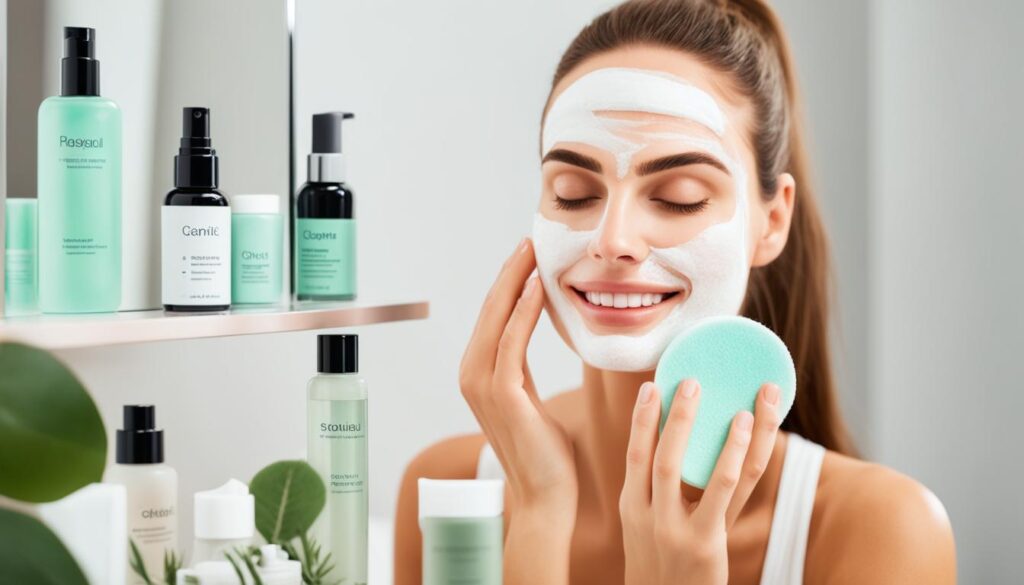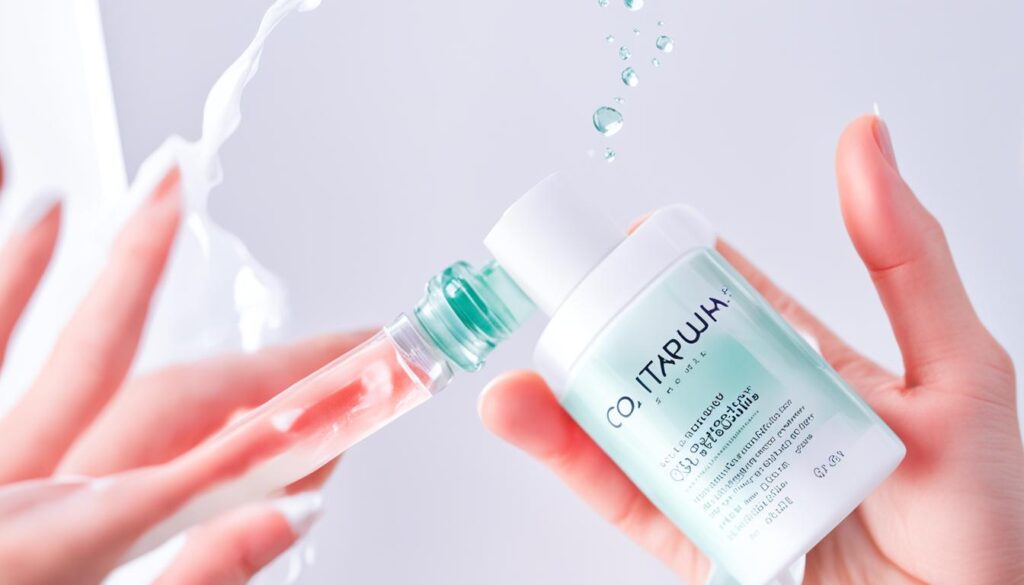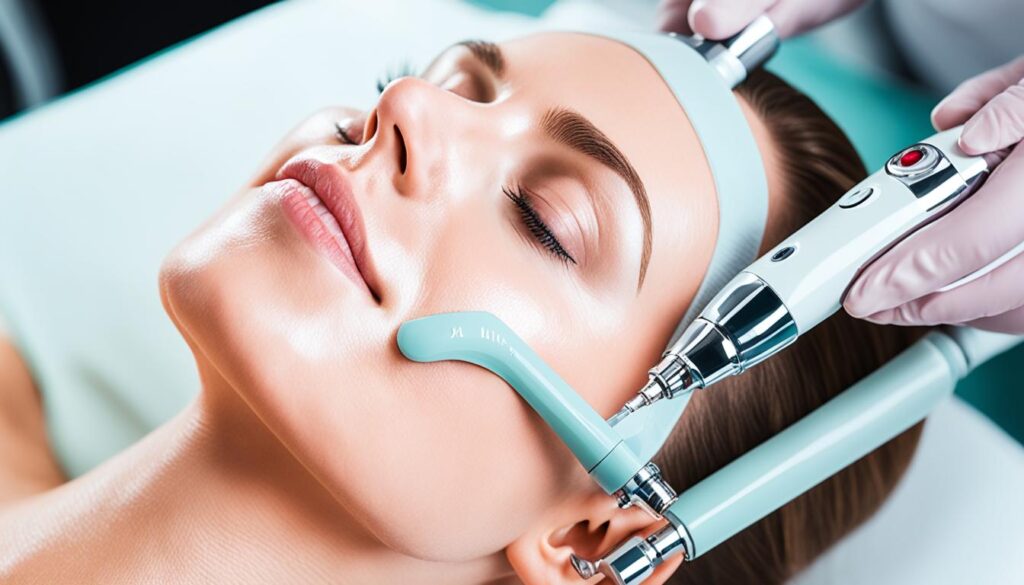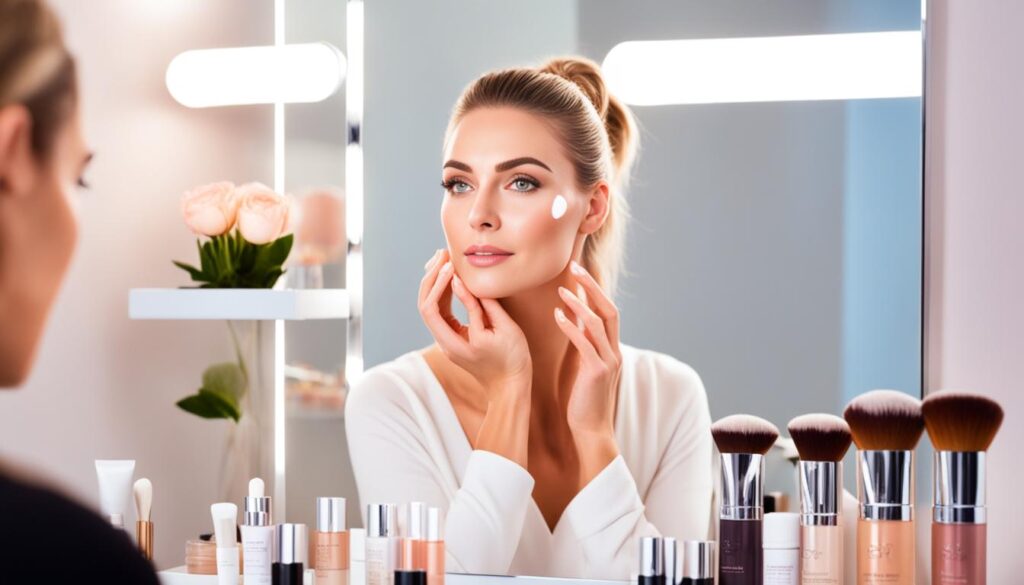Shine Control: Mastering The Art Of Oily Skin Care

Oily Skin Care can often feel like a never-ending battle, leaving individuals frustrated with persistent shine, enlarged pores, and the constant threat of breakouts. However, with the right skincare routine tailored to combat excess oil production, achieving a balanced and radiant complexion is entirely within reach. Oily skin is the result of the overproduction of sebum from sebaceous glands located under the skin’s surface. Sebum is an oily substance made of fats that helps protect and moisturize the skin, but too much sebum can lead to oily skin, whiteheads, blackheads, clogged pores, and acne.
Key Takeaways
- Oily skin is caused by excess sebum production from sebaceous glands.
- A targeted skincare routine can help control oil and prevent breakouts.
- Gentle cleansing, toning, and moisturizing are key for managing oily skin.
- Exfoliation and clay masks can help deep clean pores and refine skin texture.
- Ingredients like niacinamide, tea tree oil, and benzoyl peroxide can address specific skin concerns.
Understanding Oily Skin
At the heart of oily skin lies the overproduction of sebum, an oily substance secreted by the sebaceous glands located beneath the skin’s surface. Sebum plays a vital role in protecting and moisturizing the skin, but an excess can lead to a slew of unwanted concerns, including oily skin, whiteheads, blackheads, clogged pores, and even acne.
Also Read : Best Skin Care Routine For Healthy And Glowing Skin
What is Sebum?
Sebum is a natural oil composed of fats that the body produces to lubricate and waterproof the skin and hair. In moderation, sebum helps maintain the skin’s health and hydration levels. However, when the sebaceous glands go into overdrive, the result is an overabundance of this oily substance, leading to the development of oily skin.
Also Read : Timeless Beauty: Effective Skincare For Aging Skin
Causes of Excess Oil Production
Several factors can contribute to the excess oil production that characterizes oily skin. Genetics play a significant role, as some individuals are simply predisposed to having more active sebaceous glands. Hormonal changes, such as those experienced during puberty, pregnancy, or menopause, can also trigger increased sebum secretion. Even stress can disrupt the skin’s natural balance, leading to a surge in oil production.
Also Read : Defy Time: Advanced Skincare For Wrinkles Reduction
Daily Skincare Routine for Oily Skin Care

Effectively managing oily skin requires a targeted approach that focuses on regulating oil production, maintaining hydration, and preventing breakouts. Begin your skincare routine by thoroughly cleansing the skin to remove excess oil, dirt, and impurities.
Also Read : Bright Eyes: Effective Skincare For Dark Circles
Gentle Cleansing
Opt for a gentle, foaming cleanser formulated specifically for oily skin types. Cleanse the skin twice daily, in the morning and evening, to keep it clean and refreshed.
Also Read : Nurturing Your Skin: Essential Skincare For Pregnancy
Toning and Balancing
After cleansing, apply a clarifying toner to rebalance the skin’s pH levels and refine the appearance of pores. This step helps to remove any remaining traces of dirt or oil while tightening the pores and preparing the skin for subsequent skincare products.
Serums for Oily Skin
The next step in the daily routine for oily skin should focus on a face serum, which are concentrated products that target specific skin concerns.
Oily Skin Care Moisturizers
Oily skin requires hydration to maintain a healthy moisture barrier, so choose a lightweight, oil-free moisturizer that won’t clog pores or feel greasy on the skin. Apply moisturizer morning and night to keep the skin balanced and supple.
Sunscreen for Oily Skin
Never underestimate the importance of sun protection, especially for oily skin prone to hyperpigmentation and acne scarring. Opt for a broad-spectrum sunscreen with a lightweight, non-greasy formula that won’t exacerbate oiliness or clog pores.
Weekly Oily Skin Care Routine

To maintain a balanced, shine-free complexion, incorporate a weekly exfoliation and clay mask routine into your skincare regimen for oily skin. This targeted approach helps to address the unique needs of oily skin types, effectively controlling oil production, cleansing pores, and refining skin texture.
Exfoliation for Oily Skin
Exfoliation is key for managing oily skin, as it helps to slough off dead skin cells and prevent the buildup that can lead to clogged pores and blemishes. Limit your weekly skincare routine to 2-3 exfoliation sessions to avoid over-exfoliating, which can disrupt the skin’s natural balance and exacerbate oiliness and irritation.
Clay Masks for Oil Control
Treat your oily skin to a weekly clay mask to deeply cleanse pores, control oil production, and refine skin texture. Look for clay-based formulas infused with ingredients like charcoal or bentonite clay, which work to absorb excess oil and impurities while soothing the skin and minimizing the appearance of enlarged pores. Use a mask once or twice a week to maintain a clear, balanced complexion.
Targeted Treatments for Oily Skin Care

For those pesky breakouts and excess shine, consider incorporating targeted treatments into your routine. Ingredients like niacinamide, tea tree oil, and benzoyl peroxide can help regulate oil production, reduce inflammation, and combat acne-prone skin and blemishes.
Niacinamide for Oil Control
Niacinamide, a form of vitamin B3, is a powerhouse ingredient for managing oily skin. This multifunctional molecule works to visibly refine the appearance of enlarged pores, control oil production, and improve the overall clarity and texture of the skin. Incorporating a niacinamide serum or moisturizer into your daily routine can help maintain a balanced, shine-free complexion.
Tea Tree Oil for Acne-Prone Skin
Tea tree oil is a natural antiseptic and antimicrobial agent that can be highly effective in treating acne-prone skin. This potent essential oil helps to reduce inflammation, kill acne-causing bacteria, and unclog pores. Use a tea tree oil spot treatment or mask to target specific blemishes and prevent future breakouts.
Benzoyl Peroxide for Blemishes
For stubborn blemishes, turn to the power of benzoyl peroxide. This over-the-counter acne-fighting ingredient penetrates deep into the pores to eliminate acne-causing bacteria and dry out existing pimples. Incorporate a benzoyl peroxide-based cleanser or spot treatment into your routine to effectively clear breakouts and prevent new ones from forming.
Lifestyle Tips for Oily Skin Care

Managing oily skin extends beyond your daily skincare routine. Incorporating healthy lifestyle habits can also contribute to a balanced, shine-free complexion. By prioritizing hydration, a nutritious diet, and stress management, you can support your skin’s natural oil production and maintain an optimal level of moisture and radiance.
Hydration for Balanced Skin
Staying adequately hydrated is crucial for maintaining the skin’s barrier function and preventing excessive oil production. Aim to drink at least 8 glasses of water per day to keep your skin cells plump and well-nourished. Adequate hydration can help regulate sebum levels, minimize the appearance of pores, and prevent dryness that can lead to overcompensation and increased oil flow.
Healthy Diet for Oily Skin
Your diet plays a significant role in the health and appearance of your skin. Incorporate plenty of fruits and vegetables rich in antioxidants, vitamins, and minerals to support overall skin health. Avoid excessive consumption of processed, high-fat, and sugary foods, as these can contribute to increased oil production and breakouts. Maintaining a balanced, nutrient-dense diet can help control oil levels and promote a clear, radiant complexion.
Stress Management for Skin Health
Elevated stress levels can wreak havoc on your skin, leading to increased oil production, inflammation, and breakouts. Prioritize stress management techniques, such as practicing yoga, meditation, or deep breathing exercises, to help your body better regulate its hormonal responses and maintain a balanced skin condition. By managing stress, you can prevent the cascade of physiological changes that can exacerbate oily skin concerns.
On-the-Go Solutions for Oily Skin Care

When midday shine becomes a nuisance, having the right on-the-go solutions at your fingertips can be a game-changer. Blotting papers, mattifying powders, and mattifying sprays are essential tools in the arsenal of anyone with oily skin, offering quick and effective ways to control excess oil and maintain a fresh, shine-free complexion throughout the day.
Blotting Papers for Shine Control
Keep a pack of oil-blotting papers close by to quickly address any unwanted shine. These handy sheets are designed to gently absorb excess sebum without disturbing your makeup. Simply dab the blotting paper onto areas prone to oiliness, such as the forehead, nose, and chin, to instantly mattify the skin and refresh your look. Blotting papers are a discreet and convenient solution for managing midday shine and keeping your complexion looking its best on-the-go.
Mattifying Powders and Sprays
For a more long-lasting solution to shine control, incorporate mattifying powders and sprays into your routine. Mattifying powders help to absorb oil and diffuse the appearance of pores, leaving your skin with a flawless, matte finish. Simply dust the powder onto areas prone to shine, or use a kabuki brush to apply a light layer all over the face. Mattifying sprays, on the other hand, provide a quick and refreshing way to combat midday shine. Spritz the lightweight formula directly onto the skin to instantly mattify and set your makeup for hours of shine-free wear.
Professional Treatments for Oily Skin Care

For persistent oiliness and acne concerns, consider seeking professional treatments from a dermatologist or esthetician. Options such as chemical peels, microdermabrasion, and laser therapy can help address underlying issues, refine skin texture, and regulate oil production for long-term results.
Chemical peels, for instance, utilize alpha-hydroxy acids or beta-hydroxy acids to gently exfoliate the skin, unclog pores, and minimize the appearance of excess oil and blemishes. Microdermabrasion is another popular treatment that uses a fine-grit crystal or diamond-tipped wand to buff away the outermost layer of the skin, revealing a smoother, more refined complexion.
Laser therapy, on the other hand, targets the sebaceous glands responsible for oil production, helping to regulate sebum levels and prevent future breakouts. These advanced treatments, administered by qualified dermatologists or estheticians, can yield transformative results for those struggling with oily skin care concerns.
| Treatment | How it Works | Benefits |
|---|---|---|
| Chemical Peels | Utilizes alpha-hydroxy or beta-hydroxy acids to exfoliate and unclog pores | Minimizes excess oil and blemishes, refines skin texture |
| Microdermabrasion | Uses a fine-grit crystal or diamond-tipped wand to buff away the outermost layer of skin | Reveals a smoother, more refined complexion |
| Laser Therapy | Targets the sebaceous glands to regulate sebum production | Helps prevent future breakouts and control oily skin care concerns |
These professional treatments can be highly effective in addressing the root causes of oily skin care issues and delivering long-term results. By working closely with a qualified dermatologist or esthetician, individuals can develop a customized treatment plan to achieve a more balanced, radiant complexion.
Makeup Tips for Oily Skin Care

Achieving a flawless, long-lasting makeup look on oily skin can be a challenge, but with the right products and techniques, it’s entirely possible. Start your makeup routine by prepping the skin with an oil-controlling primer. These silicone-based formulas create a smooth canvas for makeup while helping to absorb excess oil throughout the day. Pay attention to primers labeled as “matte” or “oil-free,” and focus on applying them to areas prone to shine, such as the T-zone, to prolong the wear of your makeup and keep oiliness at bay.
Oil-Controlling Primers
Opt for a primer that contains blurring and mattifying ingredients like dimethicone or silica to minimize the appearance of pores and control shine. Apply the primer to clean, moisturized skin, focusing on the areas that tend to get shiny the fastest.
Powder Foundation for Oily Skin
Instead of using a liquid foundation, consider a powder foundation formula for oily skin types. Powder foundations help absorb excess oil and provide a natural, matte finish that lasts throughout the day. Apply the powder with a dense brush, buffing it into the skin for a seamless, flawless look.
Setting Sprays for Longevity
Finish your makeup routine with a setting spray designed to prolong the wear of your makeup and control shine. Look for setting sprays that contain ingredients like glycerin or dimethicone to create a long-lasting, matte finish. Mist the setting spray over your entire face, holding the bottle about 6-8 inches away, to lock in your makeup and keep it looking fresh all day long.
Skin Care Ingredients to Avoid for Oily Skin Care
When caring for oily skin, it’s crucial to steer clear of certain ingredients that can exacerbate the problem. Harsh, drying products that strip the skin of its natural oils can trigger increased oil production as a result, leading to a vicious cycle of excess sebum and clogged pores.
Avoid alcohol-based toners, astringents, and cleansers, as they can disrupt the skin’s delicate pH balance and compromise its protective barrier. Likewise, stay away from products containing fragrances, which can irritate and further aggravate oily skin types. Ingredients like sodium lauryl sulfate, a common foaming agent, can also be drying and overly stripping, ultimately causing the skin to produce more oil to compensate.
Instead, opt for gentle, non-comedogenic (non-pore-clogging) formulas that gently cleanse and balance the skin without disrupting its natural oil production. Look for hydrating, oil-free moisturizers and serums infused with soothing, oily skin-friendly ingredients like niacinamide, salicylic acid, and tea tree oil to effectively manage excess oil and maintain a healthy, shine-free complexion.
Mastering an effective skincare routine for oily skin types involves understanding your skin type, its specific needs, and concerns. Begin with a gentle cleanser suitable for oily, acne-prone, or combination skin, ensuring it removes excess oil and dead skin cells without compromising the skin barrier. Incorporate products tailored to regulate oil production, such as a lightweight moisturizer designed for oily skin, to keep your skin hydrated without leaving it feeling greasy. Regular exfoliation helps to unclog pores and refine skin texture, while protecting the skin from sun damage with a suitable SPF is crucial for maintaining healthy-looking skin. Select skincare ingredients like salicylic acid or niacinamide to address common skin concerns like acne or uneven skin tone. By adhering to a consistent skincare regimen, you can effectively manage excess oil, maintain balanced moisture levels, and achieve a radiant complexion without stripping the skin of its natural oils.
Crafting the best skincare routine for oily skin involves selecting suitable skincare products designed to address the specific needs of normal to oily skin types while providing effective solutions for common concerns. Begin your daily skincare regimen with a gentle cleanser formulated for normal to oily skin, ensuring it cleanses thoroughly without stripping the skin of its natural oils. Incorporate a choice skin-balancing pore-reducing toner to help soothe and calm the skin while maintaining hydration levels. A lightweight serum for oily skin can be absorbed into the skin to provide moisture and even skin tone, helping to prevent rough and bumpy skin texture. Hydrate your skin with a suitable moisturizer that won’t clog pores or leave your skin feeling greasy, while also providing hydration to the skin. Protect the delicate skin around your eyes with a hydrating eye cream suitable for all skin types. By identifying your skin type and implementing a gentle yet effective skincare routine tailored for oily skin, you can help keep your skin looking and feeling its best, with an overall even skin tone and improved texture.
Also Read: Effective Skincare For Dark Spots Solutions
Conclusion
In the pursuit of shine control and the mastery of oily skin care, diligent commitment and strategic planning emerge as the linchpins of success. As we navigate the nuances of oily skin, understanding its underlying causes and employing targeted solutions become paramount. Through a comprehensive approach that encompasses cleansing, hydration, exfoliation, and protection, we unlock the secrets to maintaining a balanced and matte complexion.
Consistency in routine becomes our ally, as we adhere steadfastly to our regimen, ensuring that each step is executed with precision and care. By selecting products specifically formulated to regulate sebum production, minimize pores, and combat shine without stripping the skin of its natural oils, we lay the foundation for a radiant and healthy complexion.
Furthermore, integrating lifestyle adjustments such as managing stress levels, maintaining a balanced diet, and staying hydrated complements our skincare efforts, amplifying their efficacy. With patience and dedication, we embark on a journey towards shine-free skin, embracing the transformative power of self-care and confidence.
In conclusion, mastering the art of oily skin care is not merely about achieving a matte complexion; it’s about reclaiming control over our skin and embracing our natural beauty with pride. As we navigate this journey, armed with knowledge and determination, we emerge victorious, radiating confidence and vitality from within.
FAQs
Q: What is oily skin and how do I identify if I have it?
A: Oily skin is a skin type characterized by excess sebum production, which can make the skin appear shiny or greasy. You may have oily skin if your skin often feels slick, has enlarged pores, and is prone to acne breakouts.
Q: What skincare products are best for oily skin?
A: Look for products specifically formulated for oily skin, such as oil-free cleansers, lightweight moisturizers, and mattifying sunscreen. Ingredients like salicylic acid and hyaluronic acid can also be beneficial for oily skin.
Q: How can I properly cleanse oily skin without stripping it?
A: Use a gentle foaming cleanser designed for oily skin to cleanse without stripping away essential oils. Avoid harsh scrubs or cleansers that leave your skin feeling tight and dry.
Q: Is it important to moisturize oily skin?
A: Yes, even oily skin needs hydration. Opt for oil-free or gel-based moisturizers to provide lightweight hydration without clogging pores.
Q: What steps can I take to control shine on my oily skin?
A: To control shine, use oil-absorbing products like mattifying primers, setting powders, and oil-control sheets throughout the day. Blotting excess oil with blotting papers can also help.
Q: How can I balance my skincare routine for combination skin?
A: For combination skin, use gentle cleansers, lightweight moisturizers, and targeted treatments for specific areas. Consider using a toner to balance the skin’s pH and focus on hydration for dry areas.
Q: Are there skincare products suitable for all skin types?
A: Yes, there are products formulated to be suitable for all skin types, such as gentle cleansers, non-comedogenic moisturizers, and hydrating serums. Look for products that cater to a wide range of skin concerns.
